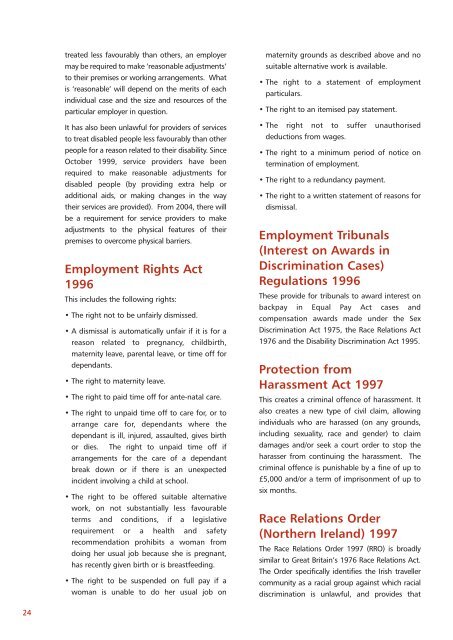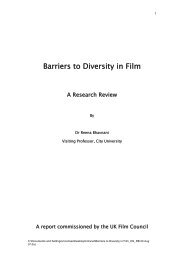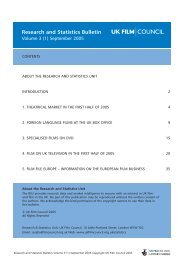Success through diversity and inclusion - BFI - British Film Institute
Success through diversity and inclusion - BFI - British Film Institute
Success through diversity and inclusion - BFI - British Film Institute
You also want an ePaper? Increase the reach of your titles
YUMPU automatically turns print PDFs into web optimized ePapers that Google loves.
24<br />
treated less favourably than others, an employer<br />
may be required to make ‘reasonable adjustments’<br />
to their premises or working arrangements. What<br />
is ‘reasonable’ will depend on the merits of each<br />
individual case <strong>and</strong> the size <strong>and</strong> resources of the<br />
particular employer in question.<br />
It has also been unlawful for providers of services<br />
to treat disabled people less favourably than other<br />
people for a reason related to their disability. Since<br />
October 1999, service providers have been<br />
required to make reasonable adjustments for<br />
disabled people (by providing extra help or<br />
additional aids, or making changes in the way<br />
their services are provided). From 2004, there will<br />
be a requirement for service providers to make<br />
adjustments to the physical features of their<br />
premises to overcome physical barriers.<br />
Employment Rights Act<br />
1996<br />
This includes the following rights:<br />
• The right not to be unfairly dismissed.<br />
• A dismissal is automatically unfair if it is for a<br />
reason related to pregnancy, childbirth,<br />
maternity leave, parental leave, or time off for<br />
dependants.<br />
• The right to maternity leave.<br />
• The right to paid time off for ante-natal care.<br />
• The right to unpaid time off to care for, or to<br />
arrange care for, dependants where the<br />
dependant is ill, injured, assaulted, gives birth<br />
or dies. The right to unpaid time off if<br />
arrangements for the care of a dependant<br />
break down or if there is an unexpected<br />
incident involving a child at school.<br />
• The right to be offered suitable alternative<br />
work, on not substantially less favourable<br />
terms <strong>and</strong> conditions, if a legislative<br />
requirement or a health <strong>and</strong> safety<br />
recommendation prohibits a woman from<br />
doing her usual job because she is pregnant,<br />
has recently given birth or is breastfeeding.<br />
• The right to be suspended on full pay if a<br />
woman is unable to do her usual job on<br />
maternity grounds as described above <strong>and</strong> no<br />
suitable alternative work is available.<br />
• The right to a statement of employment<br />
particulars.<br />
• The right to an itemised pay statement.<br />
• The right not to suffer unauthorised<br />
deductions from wages.<br />
• The right to a minimum period of notice on<br />
termination of employment.<br />
• The right to a redundancy payment.<br />
• The right to a written statement of reasons for<br />
dismissal.<br />
Employment Tribunals<br />
(Interest on Awards in<br />
Discrimination Cases)<br />
Regulations 1996<br />
These provide for tribunals to award interest on<br />
backpay in Equal Pay Act cases <strong>and</strong><br />
compensation awards made under the Sex<br />
Discrimination Act 1975, the Race Relations Act<br />
1976 <strong>and</strong> the Disability Discrimination Act 1995.<br />
Protection from<br />
Harassment Act 1997<br />
This creates a criminal offence of harassment. It<br />
also creates a new type of civil claim, allowing<br />
individuals who are harassed (on any grounds,<br />
including sexuality, race <strong>and</strong> gender) to claim<br />
damages <strong>and</strong>/or seek a court order to stop the<br />
harasser from continuing the harassment. The<br />
criminal offence is punishable by a fine of up to<br />
£5,000 <strong>and</strong>/or a term of imprisonment of up to<br />
six months.<br />
Race Relations Order<br />
(Northern Irel<strong>and</strong>) 1997<br />
The Race Relations Order 1997 (RRO) is broadly<br />
similar to Great Britain’s 1976 Race Relations Act.<br />
The Order specifically identifies the Irish traveller<br />
community as a racial group against which racial<br />
discrimination is unlawful, <strong>and</strong> provides that

















